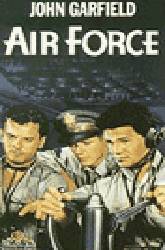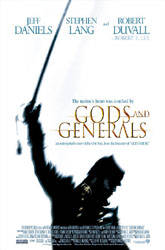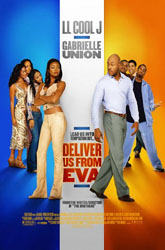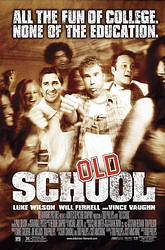 Director:
Howard Hawks
Starring:
John Ridgely
John Garfield
Harry Carey
James Brown
Gig Young
Arthur Kennedy
Charles Drake
George Tobias
Robert Wood
Release: 4 Feb. 43
IMDb
|
Air Force 
BY: DAVID PERRY[NOTE: Since this is more an analysis than a review of Air Force,
major plot points including the end are given away. It is recommended that it only
be read after watching the film.]
In one of film's most heralded -- and blatant -- uses of
propaganda during World War II, Howard Hawks' Air Force (1943) attempts to convince
American viewers (as well as any other sympathetic group who might watch the film) of the
elements of a strong army. Though the film never calls for recruits like Hawk's previous
film, Sergeant York (1941), Air Force does emphasize the importance of being a team
player. As Hawk's film makes clear, a successful war abroad cannot be won without
collective responsibilities. As viewers watched the film in 1943, they were meant to see
the altruism in the America war machine and, hopefully, find a way to sacrifice their own
individualism in the name of their all-American community.
Most of the characters in Air Force come as direct examples
of team players. At the heart of the group is Captain Mike Quincannon (Ridgely), the pilot
of the Mary Ann. While he cherishes the lives of his men -- and dies trying to save them
-- his true devotion is to the completion of his order: Quincannon and his men are to
ensure that the Japanese cannot use their plane against American soldiers. When the plane
takes off, Hawks includes a montage of each crew member checking in with Quincannon to
show that they are ready and, more importantly, that they are integral to the operations
within the Mary Ann. "It takes all of us to make this ship function," Quincannon
says. After being heralded by superiors for making it through 3 days of nonstop flying,
Quincannon states that the effort was much more on the shoulders of his crew than solely
on him.
There are only two characters who come in direct opposition
with the collectivism found within the Mary Ann. First is Sergeant Joe Winocki (Garfield),
who proudly reminds the rest of the group that he has only three months left of service.
While they are happy for their time fighting for the sanctity of their nation, Winocki
remains a voice of dissent. He has no real connection to the fraternal order he is now
stuck in -- blaming Quincannon for his failure to become a pilot, Winocki seems more
interested in finishing his army stint than he is in making the slightest relationship
with the rest of the crew. Quincannon's worry over this dissident even brings his paternal
element out (Hawks has already established Quincannon's picture perfect family in San
Francisco) by giving words of advice to Winocki in a heart-to-heart way: "You played
football, Winocki, you know how one man can gum up the whole works."
Hawks, however, does not let Winocki remain the rebellious
voice throughout. When caught in the throes of real warfare after seeing the aftermath of
Pearl Harbor, Winocki becomes just as integral a member of the group as anyone else on the
plane. Before long, his disagreeing time is completely forgotten. Earlier, as the rest of
the crew sat anxious over what was wrong with Hickham Air Base's radio, Winocki was
laughing; by the end, though, he is saving the Mary Ann and Quincannon from destruction.
Even when siding with the well being of his crew, Winocki is still prone to the occasional
fit of individualism, as is the case when he turns during an escape to shoot at oncoming
Japanese soldiers, finally stopped after being punched by Sergeant Robby White (Carey).
Whether he is selflessly hiding in a bombshell to shoot at enemy planes or simply taking
the blame for another crewman's mistake, Winocki has finally proven himself as a team
player.
The other character outside of the initial group is
Lieutenant Tex Rader (Brown), a pursuit pilot traveling to the front on the Mary Ann.
Unlike Winocki, though, Rader isn't angry in his dismissal of the fighting in a huge
bomber, but instead more genial. Rader isn't necessarily disdainful over the way the Mary
Ann crew works together, but simply prefers the sole responsibility of being a solo pilot.
As he tells the rest of the crew, "I just don't want to fight in any airplane that
more than one man can ride in. I don't want to be responsible for 8 to 10 other guys, or
depend on them either."
He is the butt of constant jokes from the crew because they
see him as over-confident and unwilling to join in on their little family, even when they
are fighting a similar battle in the air. In a pivotal action sequence, as Hawks cuts from
each of the men in the Mary Ann doing their job to stop a Japanese attack, Rader is the
only person onboard who is never seen. Of course, he too comes to see the attributes of
the team in the climactic battle of the crippled Mary Ann. He has learned that he can
depend on everyone else.
In the final showdown, Hawks makes it clear that the
military successes of the U.S. Army Air Force in the days after Pearl Harbor were not
based on the prowess of the pursuit pilots like Rader, however, but instead through the
initiative of many men working together. Earlier, the single bomber plane, with the
communal work of its crew, defeats a barrage of solo-piloted Japanese planes; now, the
bomber pilots serve as informants for the pursuit planes, helping to bring the rest of the
Australia-based forces into an air attack that would cripple the Japanese fleet before
they make it to their target. Not only is there a constant flow of information between the
Mary Ann and the solo pilots, but also a collection of shots showing the men on the ground
helping to get the information from one base to another. Hawks is essentially showing that
the war could not be won without everyone pitching in. He almost creates the impression
that America could have won World War II in a matter of weeks if they only had a few more
troops.
By pushing the ideals of group over individual, Hawks
creates some detachment to emotional scenes. When White learns that his son is dead, the
time of mourning is cut short by his need to return to the crew and ensure the safety of
the Mary Ann. The most grief found in the film is for Quincannon, but it similarly doesn't
take terribly long for the crew to diligently get back to work under the command of a new
leader. While they adored Quincannon as a man, their real responsibility is to the U.S.
Army. Victorious in this battle and ready for their next, they all convene to ride
alongside a dozen other planes.
All this makes sense considering the propagandist intents
of the film. Air Force -- almost to a fault -- constantly presses its agenda, hoping to
create an upsurge in nationalism and community work. The central idea is that these men
are all integral to the success of the American war effort. Their success in carrying out
the impromptu American plan in the Pacific Ocean after Pearl Harbor is because each man
worked together, beyond their social, economic, and geographic differences to build a
mighty fleet in a single bomber.
 |







